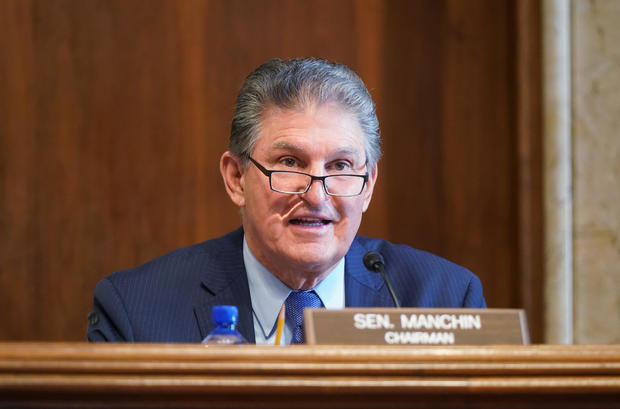House Democrats charge ahead with progressive bills likely to stall Senate
Washington — House Democrats are pursuing an ambitious agenda to approve several progressive bills supported by President Biden in the coming weeks, but these measures face an uncertain future in the evenly divided Senate, where most legislation will require support from Republicans to advance.
The House is expected vote on H.R. 1, a comprehensive election reform bill, later this week. It is also expected to take up a wide-ranging policing reform bill, a gun control measure and a labor bill protecting union organizing rights. This comes after the House approved the Equality Act last week, a bill that would enshrine legal protections for LGBTQ Americans.
Several of these measures have previously passed in the House but stalled in the Senate, as then-Majority Leader Mitch McConnell refused to bring them to the floor for consideration. Speaker Nancy Pelosi had referred to McConnell as the "grim reaper," overseeing the "legislative graveyard" of the Senate. However, even with Democrats now nominally in control of the Senate, many of these bills still face an uncertain future.
Democrats have the narrowest possible majority in the Senate, with 50 seats and Vice President Kamala Harris casting any tie-breaking vote. But most legislation in the Senate requires 60 votes to advance, meaning that Democrats would need support from at least 10 Republicans.
Senate Majority Leader Chuck Schumer told reporters on Tuesday that Democrats are "going to figure out the best way to get big, bold action on a whole lot of fronts."
"We're not going to be the legislative graveyard. Very simply, McConnell refused to put bills on the floor. I'm putting bills on the floor. People are going to be forced to vote on them, yes or no," Schumer said.
Progressives have pushed for Senate Democrats to eliminate the legislative filibuster, which would allow legislation to advance with a simple majority of votes. But getting rid of the filibuster would also require 51 votes, and at least two Democrats have expressed opposition to taking this action, colloquially known as the "nuclear option."
Senator Joe Manchin of West Virginia, one of the most moderate Democrats in the Senate who now has the power to almost single-handedly block many progressive priorities, has been particularly vehement in his opposition to eliminating the filibuster.
"Never! Jesus Christ! What don't you understand about never?" Manchin said Monday when asked by reporters if he would change his mind about invoking the nuclear option.
Senate Democrats invoked the nuclear option to eliminate the filibuster for most judicial nominees in 2013, and Republicans eliminated the filibuster for Supreme Court nominees in 2017. Defenders of the filibuster argue that it preserves the rights of the minority, but opponents say that it allows the minority to hold the will of the majority of Americans hostage by preventing the party in power from implementing its agenda.
Republicans have expressed opposition to several of the bills under consideration in the House. H.R. 1 was a major target of speakers during the Conservative Political Action Conference over the weekend, and was even mentioned by former President Donald Trump in his speech. The legislation includes campaign financing reform, expanding voting rights and anti-corruption measures.
There is also disagreement between parties on how best to address policing reform. The House will again bring forward the George Floyd Justice in Policing Act, named after the Minnesota man who died in police custody last year after an officer kneeled on his neck for several minutes, instigating a wave of protests against racial violence and police brutality over the summer.
The legislation would ban chokeholds and overhaul qualified immunity protections for law enforcement. However, the qualified immunity provision is a sticking point for Republicans. Republican Senator Tim Scott, the lone Black Republican in the Senate, introduced a policing reform bill last year that did not address qualified immunity, but this legislation was blocked by Democrats who argued that it did not go far enough.
Scott told reporters on Monday that he had an initial conversation with Congresswoman Karen Bass, the lead sponsor of the George Floyd Justice in Policing Act, "looking at the bill holistically."
"We did not come to any conclusions. We have not started negotiating any parts of it," Scott said.
Meanwhile, Democratic Senator Chris Murphy of Connecticut reintroduced legislation Tuesday that would require universal background checks on the sale or transfer of all firearms. Although the measure has Republican co-sponsors in the House, its prospects in the Senate are uncertain.
Many progressives in the House argue that compromising with Republicans would mean passing significantly watered-down legislation. As a workaround to avoid being stymied by the filibuster, the Senate majority can use budget reconciliation to pass some bills with a simple majority. Congress is currently using the budget reconciliation process to pass Mr. Biden's $1.9 trillion COVID relief bill, but there are strict rules governing the process.
The Senate parliamentarian ruled last week that the relief bill could not include a provision to raise the federal minimum wage to $15 under budget reconciliation rules. Even if the House manages to pass a separate bill hiking the minimum wage to $15, it would likely die in the Senate. Democrats may have to settle for negotiating with Republicans in the Senate on increasing the minimum wage to a smaller amount.




